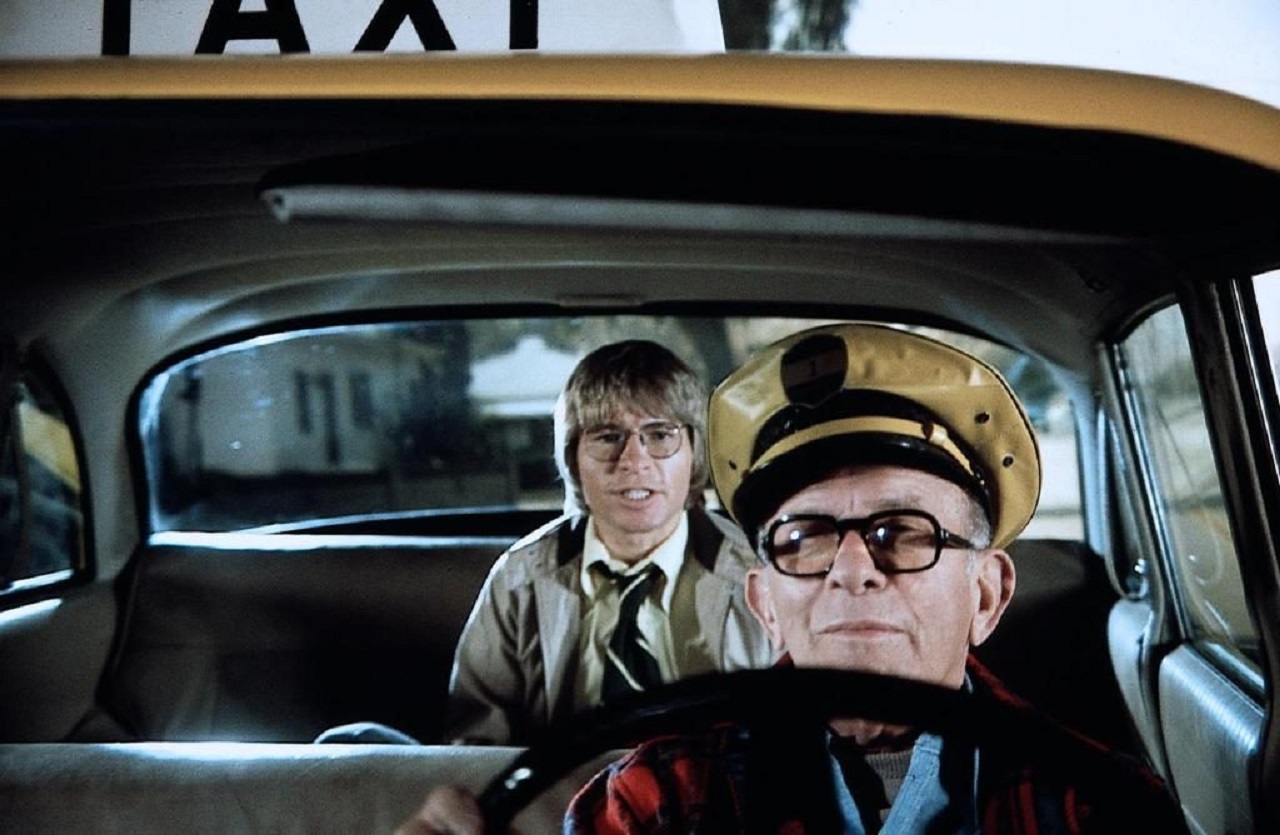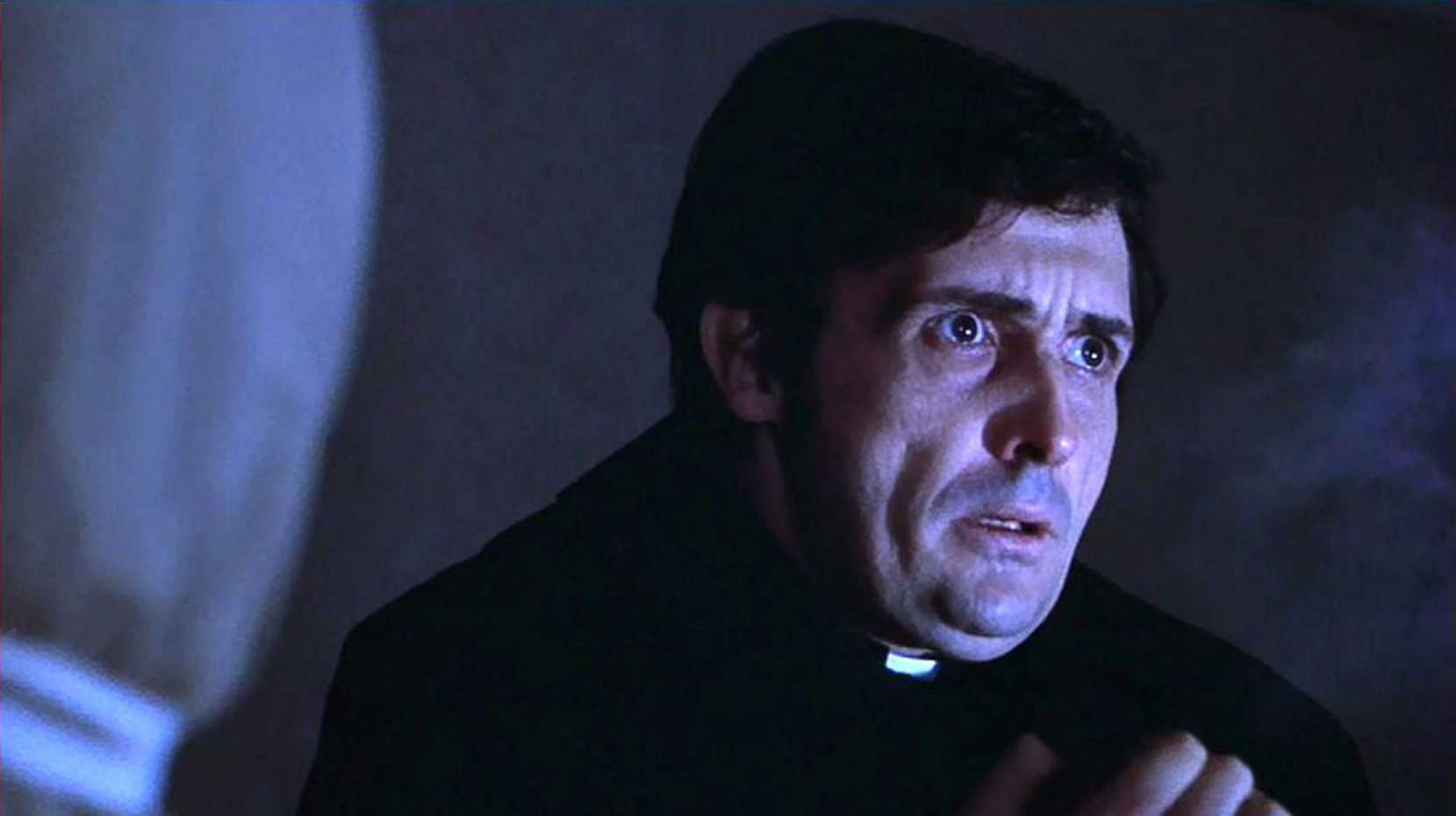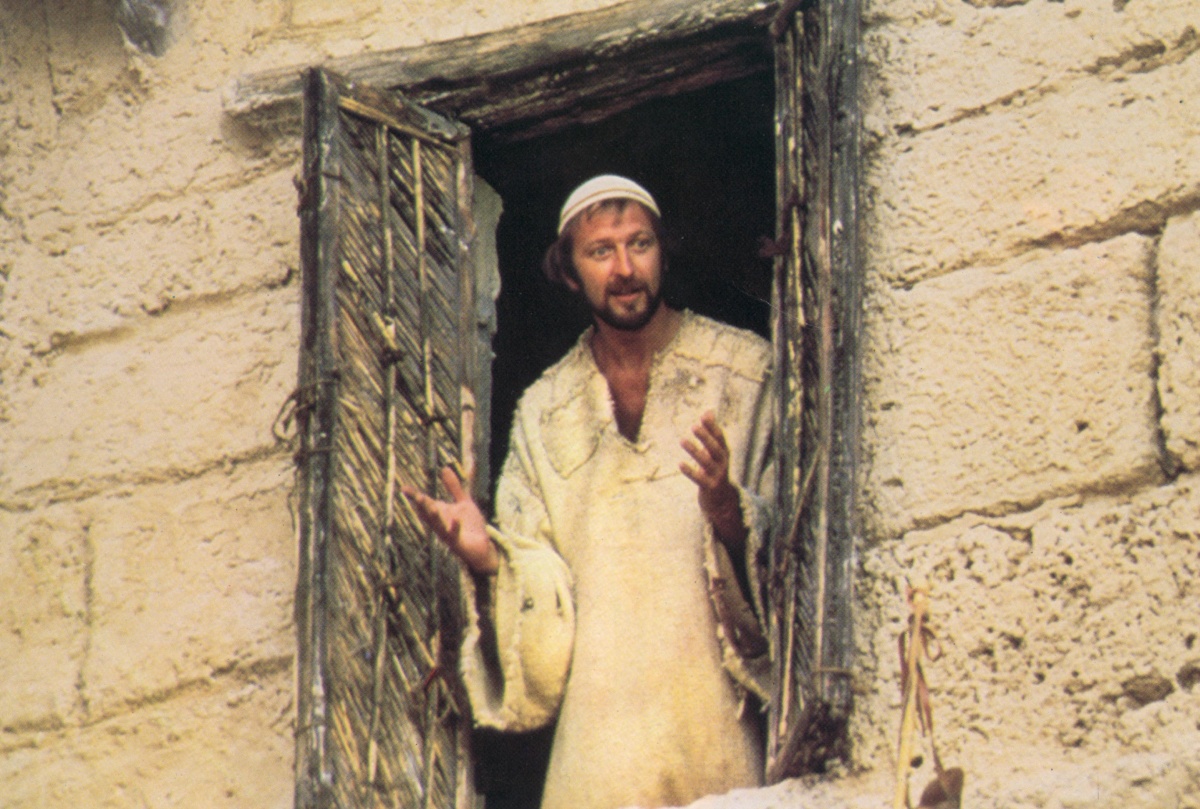Religion concerns the belief in a creator deity and the practice of worship. Doing so usually requires adherence to a moral code of some type and obeisance, sometimes sacrifice, to said deity. Practice thereof widely varies from region to region, or even within factions of the same religion. Religion in Fantastic Cinema deals with the different ways this is portrayed on screen in films and tv.
Specific religions and their associated mythologies are dealt with under the topics Biblical and Christian Themes, Catholicism, Eastern Beliefs, Hinduism, Judaism and Islam.
Appearances of The Almighty are dealt with under Films About God, while all other gods are covered under Gods and Deities. Occurrences of the miraculous are discussed under Films About Miracles.
The afterlife, which most religions concern themselves with, is dealt with under Films About The Afterlife, Films About Heaven and Films About Hell. Strange breakaway religious factions and their usually controlling behaviour are dealt with under Cults; fictional religions such as those in the future or that might exist on other worlds are covered under New Religions.
Traditional Religion
On the whole, light fantasies of the 1940s, though populated with angels and containing many visits to the afterlife, both Heaven and Hell, eschewed coming down on the side of any particular religious belief.
Occasionally such things managed to slip by. In The Bishop’s Wife (1947), Cary Grant plays an angel who comes down from Heaven to aid overworked bishop David Niven; Angels in the Outfield (1951) managed to wind a plot concerning invisible angels aiding a baseball team into a preachy debate about faith. A modern variant was Oh, God! (1977) and sequels where God (George Burns) appears to ask various individuals to help promote His message, which in the first film also comes with a barbed attack against organised religion.

There was a strong undertow of religion to much of 1950s science-fiction, the period when revivalists like Billy Graham were beginning their crusade. The alien invasion classic The War of the Worlds (1953) culminates with humanity singing hymns to the Almighty for their delivery from the alien invaders. In Conquest of Space (1955), the commander of a mission to Mars cracks up and believes the mission is entering into divinely forbidden territory, before a seeming miracle from The Almighty ends up saving the expedition.
The strangest of these films were The Next Voice You Hear … (1950) in which the voice of God appears on radios all around the world and Red Planet Mars (1952) where a scientist picks up radio messages from Mars that seem to be being sent by God, which causes a worldwide religious upsurge that overthrows the Soviet Union.
Other Religions
Wes Craven’s The Serpent and the Rainbow (1988) was the first film to treat voodoo as a serious religion, while another strong treatment of voodoo came in Zombi Child (2019). The existing religion of Santeria, a mix of Catholicism and voodoo, was examined in The Believers (1987) where it was given a horror movie treatment.
The fantastical Simon Magus (1999) concerned the struggle of a 19th Century Orthodox Jewish village to survive in the face of modernity. Both The Vigil (2019) and The Offering (2022) are horror films that are set around Orthodox Judaism.
The Heavenly Creature segment of Doomsday Book (2012) deals with the dilemma monks face when a robot logically concludes that it is the Buddha, while The Creator (2023) shows that artificial human beings have adopted Buddhist religion.
The Mists of Avalon (2001) is a take on the Arhurian legends that focuses on Celtic paganism and goddess worship, while The Wicker Man (1973) concerns a modern-day Celtic pagan religion cult. In the probably fictional religions category, The Lair of the White Worm (1988) concerns the revival of an Ancient Roman snake-worshipping cult.
Questions of Faith
The Exorcist (1973) created cliches about exorcism and possession but underneath has a strong plot about a Jesuit priest regaining his faith. The Last Exorcism (2010) concerns a revival preacher who fakes exorcisms who is suddenly forced to deal with the real thing.
Andrei Tarkovsky’s The Sacrifice (1986) concerned a dilemma that comes as nuclear war falls where an aging man prays to God, offering to sacrifice all that he has if events will be turned back, only to wake in the morning and find life as normal and then be forced to follow through with his promise. The Third Miracle (1999) has Ed Harris as a Catholic priest who had lost his faith and is asked to investigate the case of a seemingly genuine miracle. The Rapture (1991) concerns a woman’s sudden loss of faith as the Biblial Apocalypse nears.

Contact (1997) sets up a debate between religion and science (albeit muted from what it was in Carl Sagan’s original novel), before coming to the dubious conclusion that both are two sides of the same coin. The Body (2001) concerns the fight that occurs between various parties when what appears to be Christ’s body is uncovered by archaeologists. The Da Vinci Code (2006) concerns the uncovering of a secret historical conspiracy to protect a bloodline descended from Jesus Christ.
Also of note is M. Night Shyamalan’s Signs (2002) wherein Mel Gibson’s ex-priest regains his faith by discovering that all the elements of his life have been predestined leading up to help him defeat an alien invasion. A belief in predestination runs through many of Shyamalan’s films. The discovery of faith is also dealt with in The Ninth Configuration (1979) and The X Files: I Want to Believe (2008).
Dogma (1999) is Kevin Smith’s wittily irreverent questioning of how Catholicism and religion can remain relevant in the modern era. The Rosary Murders (1987) features Donald Sutherland as a Catholic priest who suffers a crisis of conscience when a serial killer confesses in his confessional.
Voices of Criticism
Criticism of religion forms a strong theme running throughout the works of Ingmar Bergman who was raised in the Lutheran church and rebelled against it. Bergman’s classic The Seventh Seal (1957) features a Mediaeval knight trying to keep Death at bay with a game of chess and becomes a profound meditation on the loss of faith. Bergman’s family saga Fanny and Alexander (1982) concerns a wife who remarries to an insanely cruel and ascetic Lutheran minister.
A similar weight hangs over Carl Dreyer’s Ordet (1955) and its pondering of different religious points-of-view before the appearance of a genuine miracle. Peter Greenaway’s The Baby of Mâcon (1993) is biting about traditional organised religion, where the appearance of a miraculous baby has harsh and unforeseen consequences for a woman who claims to have Immaculately Conceived the child. Greatly underrated is Black Death (2010) concerning the loss of faith of 14th Century witch hunters sent to burn a village of witches who have seeming resurrection powers.
One of the most remarkable films is Lars von Trier’s Breaking the Waves (1996) about a woman (Emily Watson) in a small tight-knit religious community who believes that she is called to debase herself and be a whore so that God will miraculously cure her crippled husband. The grim and powerful Martyrs (2008) concerns a mysterious group who torture girls as an experiment in martyrdom to determine the nature of the afterlife.

Enormously controversy laden at the time it came out was Monty Python’s The Life of Brian (1979), an hilariously witty skewering of all matters Christian. A lighter example was the Australian comedy The Man Who Sued God (2001) in which Billy Connolly sues the churches in court for the Acts of God claimed by the insurance industry.
The Mist (2007) concerns itself with the arrival of a fog containing deadly monsters and how a small group of survivors huddled in a supermarket are swayed to extremes by a religious fundamentalist. One film that got its bite into the American Evangelical movement was Teeth (2007) wherein a teenage chastity campaigner discovers that she has a vagina with a set of teeth.
One of the most profound works dealing with religion was the tv mini-series Angels in America (2003), which challengingly confronted the attitudes of conservative (Mormon) religion towards the gay community during the early days of the AIDS epidemic, ending with one infectee climbing a flaming ladder to Heaven to confront an absentee Creator. Mormonism (and Christianity in general) is also in for it in the extraordinary Heretic (2024) where Hugh Grant imprisons two missionary girls with the intent of making them witness a resurrection, while also challenging their beliefs.
Both the Stephen King adaptation The Green Mile (1999) and the Danish In Your Hands (2004) concern prison inmates who have miraculous healing abilities and the moral questions that surround an Almighty who allows them to be condemned or of Him placing such abilities in the hands of a murderer.
The Bollywood film PK (2014) is a sharp satire concerning the confusions faced by an alien visitor when he tries to make sense of India’s different religions and their conflicting dictates.
Toxic Religion
Christian dystopias are depicted in films such as Escape from L.A. (1996) and the witty satire Existo (1999). The strongest of these was the Margaret Atwood adapted The Handmaid’s Tale (1990) and the later tv series The Handmaid’s Tale (2017- ), which shows a future where most people are sterile and the few remaining fertile women are enslaved by a fundamentalist elite in order to breed. Peter Watkins’ Privilege (1967) is set in a near-future where the government manipulate the popularity of a rock singer, getting him to undergo a conversion to Christianity as a means of quelling youth revolt. One of the strangest dystopias was the one featured in Franklyn (2008), which is partially set in a world where it is mandatory that everybody has a religion (although it does not matter what type).
One of the strongest works about religion was Robert Eggers’ The Witch: A New-England Folktale (2015), a work set in the 17th Century Puritan era amid a mindset that was fearful of sin and any incursion of evil. The Last Thing Mary Saw (2021) was a similar horror work set among a harsh mid-19th Century religious household that tries to stamp out an attraction between the daughter and a maid.
Strangest Dreams: Invasion of the Space Preachers (1990) concerned alien invaders come in the form of televangelists whose broadcasts contain mind control messages. In We Summon the Darkness (2019), we learn that a spate of ritual Satanist killings is being created by the followers of a televangelist to drive up church attendance.
There are occasional psycho films that deal with characters who are driven to kill out of religious fixation, such as The Fanatic/Die, Die, My Darling (1965), The Fiend/Beware My Brethren (1971), Resurrection (1999), Frailty (2001), Timber Falls (2007), Candy Land (2022) and MaXXXine (2024). Psychopathic Catholic priests feature in Don’t Torture a Duckling (1972), Seven Blood-Stained Orchids (1972), House of Mortal Sin/The Confessional (1976), Crimes of Passion (1984), Freeway (1988) and Purgatory Road (2017) and a murderous nun in The Killer Nun (1979). Saint Maud (2019) was a disturbing depiction of one nurse’s descent into religious obsession in her determination to save a dying woman’s soul. The Leech (2022) featured Graham Skipper as a mild-mannered Catholic priest pushed over into a nightmare and eventually murder by two unruly housguests. One could also add Robert Mitchum’s murderous conman/hellfire preacher in the excellent The Night of the Hunter (1955).
Somewhere in here, one could also include Piper Laurie as the insane religion-obsessed mother in Carrie (1976), as well as the Carrie-copy Jennifer (1978) set among a snake-handling cult.
One work of considerable fascination was Midnight Mass (2021), which does an extraordinary job in sifting through all of the Biblical references to blood and resurrection to draw out a complex metaphor for vampirism being the mentioned Christian resurrection.
Recommendations
- The Night of the Hunter (1955)
- Ordet (1955)
- The Seventh Seal (1957)
- The Wicker Man (1973)
- Monty Python’s The Life of Brian (1979)
- The Sacrifice (1986)
- The Rapture (1991)
- The Baby of Mâcon (1993)
- Breaking the Waves (1996)
- Dogma (1999)
- The Third Miracle (1999)
- Angels in America (2003)
- Black Death (2010)
- PK (2014)
- The Witch: A New-England Folktale (2015)
- The Handmaid’s Tale (2017- )
- Saint Maud (2019)
- The Vigil (2019)
- Midnight Mass (2021)
- The Leech (2022)
- Heretic (2024)
A full list of titles can be found here Religion

